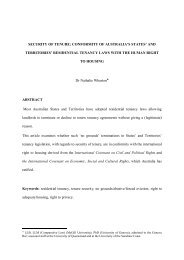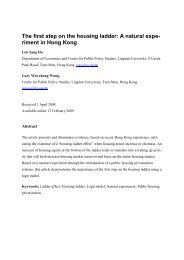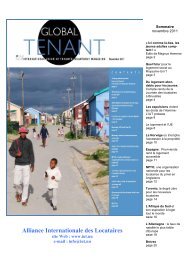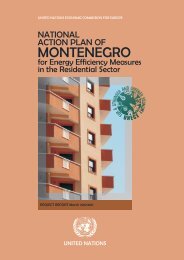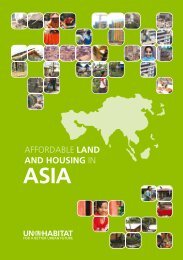housing developments in european countries - Department of ...
housing developments in european countries - Department of ...
housing developments in european countries - Department of ...
Create successful ePaper yourself
Turn your PDF publications into a flip-book with our unique Google optimized e-Paper software.
Section 2<br />
Context<br />
Context Section 2<br />
2.4 Bulgaria<br />
2.4.1 Policy Mak<strong>in</strong>g and<br />
Implementation<br />
A national <strong>hous<strong>in</strong>g</strong> strategy for Bulgaria was adopted<br />
by government <strong>in</strong> 2004. Accord<strong>in</strong>g to this document<br />
the key aim <strong>of</strong> Bulgarian <strong>hous<strong>in</strong>g</strong> policy is to achieve<br />
the follow<strong>in</strong>g:<br />
■ halt the process <strong>of</strong> deterioration <strong>in</strong> the quality <strong>of</strong><br />
the exist<strong>in</strong>g <strong>hous<strong>in</strong>g</strong> stock, and<br />
■ <strong>in</strong>troduce an operational mechanism for the<br />
provision <strong>of</strong> new accessible dwell<strong>in</strong>gs (owned and<br />
rented).<br />
The national <strong>hous<strong>in</strong>g</strong> strategy also addresses the<br />
priorities and actions for the implementation <strong>of</strong> the<br />
strategic goals <strong>of</strong> <strong>hous<strong>in</strong>g</strong> policy and identifies the most<br />
urgent reforms and <strong>hous<strong>in</strong>g</strong> needs, tak<strong>in</strong>g <strong>in</strong>to account<br />
the acute f<strong>in</strong>ancial deficits <strong>of</strong> the State, municipalities<br />
and households.<br />
Accord<strong>in</strong>g to the strategy, three strategic goals will be<br />
implemented <strong>in</strong> three operational directions. These are:<br />
■ operational direction A: Draw<strong>in</strong>g up a framework<br />
for the National Hous<strong>in</strong>g System;<br />
■ operational direction B: Solv<strong>in</strong>g priority issues <strong>of</strong><br />
<strong>hous<strong>in</strong>g</strong> consumption and<br />
■ operational direction C: Carry<strong>in</strong>g out an<br />
<strong>in</strong>formational and educational campaign.<br />
Two programmes have been <strong>in</strong>itiated for the purposes<br />
<strong>of</strong> achiev<strong>in</strong>g operational direction A. These address the<br />
draw<strong>in</strong>g up <strong>of</strong> an <strong>in</strong>stitutional framework and the<br />
improvement <strong>of</strong> the f<strong>in</strong>ancial-credit and tax system <strong>in</strong><br />
the <strong>hous<strong>in</strong>g</strong> sector. These programmes <strong>in</strong>clude:<br />
■ enhanc<strong>in</strong>g the capacity <strong>of</strong> the <strong>in</strong>stitutions which<br />
have to implement the <strong>hous<strong>in</strong>g</strong> policy and apply the<br />
strategy (on national and municipal level);<br />
■ regulat<strong>in</strong>g legislation <strong>in</strong> relation to the commitments<br />
<strong>of</strong> the State and municipalities to the <strong>hous<strong>in</strong>g</strong><br />
system (f<strong>in</strong>ancial and organisational), and<br />
■ creat<strong>in</strong>g conditions for the accumulation <strong>of</strong> <strong>hous<strong>in</strong>g</strong><br />
capital for the renovation and construction <strong>of</strong><br />
accessible dwell<strong>in</strong>gs (subsidised/guaranteed credits,<br />
tax relief, etc.).<br />
Under the auspices <strong>of</strong> operational direction B the<br />
follow<strong>in</strong>g set <strong>of</strong> specialised programmes will be<br />
implemented:<br />
■ management and ma<strong>in</strong>tenance <strong>of</strong> the exist<strong>in</strong>g<br />
<strong>hous<strong>in</strong>g</strong> stock (improvement <strong>of</strong> the management <strong>of</strong><br />
apartment blocks, <strong>in</strong>troduction <strong>of</strong> a technical<br />
passport and energy certificate for build<strong>in</strong>gs);<br />
■ restructur<strong>in</strong>g and renovation <strong>of</strong> <strong>hous<strong>in</strong>g</strong> complexes<br />
(def<strong>in</strong>ition <strong>of</strong> boundaries and obta<strong>in</strong><strong>in</strong>g <strong>of</strong> legal<br />
status with respect to landed property, def<strong>in</strong>ition <strong>of</strong><br />
the right <strong>of</strong> ownership over the land);<br />
■ renovation <strong>of</strong> pre-fabricated <strong>hous<strong>in</strong>g</strong> build<strong>in</strong>gs<br />
(identification and classification <strong>of</strong> the exist<strong>in</strong>g prefabricated<br />
dwell<strong>in</strong>gs, provision <strong>of</strong> projects for<br />
renovation <strong>of</strong> <strong>hous<strong>in</strong>g</strong> build<strong>in</strong>gs, regulation <strong>of</strong><br />
obligations <strong>of</strong> participants <strong>in</strong> renovation);<br />
■ provision <strong>of</strong> access to dwell<strong>in</strong>gs for families with<br />
low <strong>in</strong>come (<strong>in</strong>creas<strong>in</strong>g the public rented <strong>hous<strong>in</strong>g</strong><br />
stock, allocat<strong>in</strong>g terra<strong>in</strong>s for construction freely or<br />
at favourable prices), and<br />
■ improvement <strong>of</strong> <strong>hous<strong>in</strong>g</strong> conditions <strong>of</strong> the Roma<br />
population.<br />
The follow<strong>in</strong>g programmes have been <strong>in</strong>itiated under<br />
the auspices <strong>of</strong> operational direction C:<br />
■ <strong>in</strong>formational and educational campaign among<br />
citizens (reach<strong>in</strong>g public agreement on the new<br />
<strong>hous<strong>in</strong>g</strong> policy) and<br />
■ and, tra<strong>in</strong><strong>in</strong>g for district and municipal adm<strong>in</strong>istrations<br />
<strong>in</strong> order to implement the new <strong>hous<strong>in</strong>g</strong><br />
policies and programmes.<br />
The National Hous<strong>in</strong>g Strategy also <strong>in</strong>volves an Action<br />
Plan cover<strong>in</strong>g the period 2004-2006. This specifies the<br />
tasks necessary for the implementation <strong>of</strong> the various<br />
programmes, the <strong>in</strong>dividuals <strong>in</strong> charge <strong>of</strong> the<br />
implementation and the necessary f<strong>in</strong>ancial resources<br />
for realis<strong>in</strong>g the strategy.<br />
Table<br />
2.4.1<br />
2.4.2 Stock<br />
Characteristics <strong>of</strong> the Hous<strong>in</strong>g Stock<br />
<strong>in</strong> Bulgaria, 2002<br />
Tenure %<br />
State and municipal 3.0<br />
Owner-occupied 96.5<br />
Other 0.5<br />
The M<strong>in</strong>istry <strong>of</strong> Regional Development and Public<br />
Works will play a lead<strong>in</strong>g and co-ord<strong>in</strong>at<strong>in</strong>g role <strong>in</strong> the<br />
implementation <strong>of</strong> the Action Plan. In addition, the<br />
follow<strong>in</strong>g are also responsible for the implementation<br />
<strong>of</strong> the <strong>hous<strong>in</strong>g</strong> policy: the M<strong>in</strong>istry <strong>of</strong> F<strong>in</strong>ance, the<br />
M<strong>in</strong>istry <strong>of</strong> Economy, the M<strong>in</strong>istry <strong>of</strong> Labour and<br />
Social Policy, the M<strong>in</strong>istry <strong>of</strong> Energy and Energy<br />
Resources, along with the Agency for Energy Efficiency<br />
and the local authorities.<br />
In 2002, the total stock <strong>of</strong> dwell<strong>in</strong>gs <strong>in</strong> Bulgaria stood<br />
at 3,691,787. TABLE 2.4.1 above <strong>in</strong>dicates that 96.5%<br />
<strong>of</strong> these dwell<strong>in</strong>gs were owner-occupied, which is the<br />
second highest rate <strong>of</strong> owner occupation among the<br />
28 <strong>countries</strong> exam<strong>in</strong>ed <strong>in</strong> this review. 3% <strong>of</strong> Bulgarian<br />
dwell<strong>in</strong>gs were owned by the State or municipalities.<br />
State dwell<strong>in</strong>gs are rented by State employees, while<br />
municipal dwell<strong>in</strong>gs are effectively social rented.<br />
These are allocated to households <strong>in</strong> need <strong>of</strong> <strong>hous<strong>in</strong>g</strong><br />
who meet specified tenure and social requirements.<br />
The ‘other’ category <strong>in</strong> the table refers to dwell<strong>in</strong>gs<br />
owned by commercial enterprises, public organisations<br />
or co-operative organisations, which are used by their<br />
employees.<br />
The number <strong>of</strong> dwell<strong>in</strong>gs per 1,000 persons<br />
<strong>in</strong> Bulgaria stood at 471 <strong>in</strong> 2002, which is<br />
among the highest <strong>of</strong> the <strong>countries</strong> under<br />
exam<strong>in</strong>ation. Indeed the number <strong>of</strong><br />
dwell<strong>in</strong>gs <strong>in</strong> Bulgaria exceeds the number<br />
<strong>of</strong> households. However, the geographical<br />
distribution <strong>of</strong> dwell<strong>in</strong>gs <strong>in</strong> the country<br />
does not reflect the distribution <strong>of</strong> the<br />
population. As a result, 14.4% <strong>of</strong> all<br />
dwell<strong>in</strong>gs <strong>in</strong> the country are vacant. Most<br />
Table<br />
2.4.2<br />
Category<br />
<strong>of</strong> these are located <strong>in</strong> decl<strong>in</strong><strong>in</strong>g areas and many are<br />
abandoned or semi-demolished, or lack basic facilities<br />
such as central heat<strong>in</strong>g and electricity, gas and water<br />
supply. Conversely, only 69.3% <strong>of</strong> the dwell<strong>in</strong>gs are<br />
occupied by only 1 household; 130,000 dwell<strong>in</strong>gs<br />
accommodate 3 or more persons per room, while a<br />
further 55,000 accommodate 4 or more persons per<br />
room.<br />
In 2002, 88,610 dwell<strong>in</strong>gs (or 2.4% <strong>of</strong> total) lacked all<br />
basic facilities and although the vast majority <strong>of</strong> the<br />
rema<strong>in</strong><strong>in</strong>g population has access to a water and<br />
electricity supply, the quality and reliability <strong>of</strong> both<br />
services is problematic. Over 82% <strong>of</strong> dwell<strong>in</strong>gs are<br />
equipped with an <strong>in</strong>ternal water supply and toilet, but<br />
only 40% are connected to a sewage treatment system.<br />
12.7% <strong>of</strong> dwell<strong>in</strong>gs have central heat<strong>in</strong>g, all <strong>of</strong> which<br />
are located <strong>in</strong> urban areas. As a result <strong>of</strong> poor heat<strong>in</strong>g<br />
systems, coupled with the fact that 80% <strong>of</strong> basements<br />
and attic floors <strong>in</strong> the exist<strong>in</strong>g <strong>hous<strong>in</strong>g</strong> stock are<br />
without thermal <strong>in</strong>sulation, 70% <strong>of</strong> the domestic<br />
energy consumption <strong>in</strong> the country is for heat<strong>in</strong>g.<br />
2.4.3 Economy<br />
TABLE 2.4.2 illustrates the key economic trends <strong>in</strong><br />
Bulgaria between 2000 and 2002. It reveals that the<br />
rate <strong>of</strong> <strong>in</strong>crease <strong>in</strong> GDP (measured <strong>in</strong> current prices)<br />
fell slightly between 2000 and 2002, from 5.4% to<br />
4.8%. However, GDP rates <strong>in</strong> the latter year are still<br />
relatively high when compared to many other <strong>countries</strong><br />
exam<strong>in</strong>ed <strong>in</strong> this review. Inflation <strong>in</strong> Bulgaria has also<br />
fallen significantly <strong>in</strong> recent years, from 10.3% <strong>in</strong> 2000<br />
to 5.8% <strong>in</strong> 2002. However, unemployment rates are<br />
comparatively high – they stood at 16.8% <strong>in</strong> 2002.<br />
Economic Trends <strong>in</strong> Bulgaria, 2000-2002<br />
Year<br />
2000 2001 2002<br />
% % %<br />
Real <strong>in</strong>crease <strong>in</strong> GDP (<strong>in</strong> current prices) 5.4 4.1 4.8<br />
Average annual <strong>in</strong>flation 10.3 7.4 5.8<br />
Unemployment (at year end) 16.4 19.5 16.8<br />
24 European Union Report<br />
Regular National Report on Hous<strong>in</strong>g Developments <strong>in</strong> European Countries<br />
25




